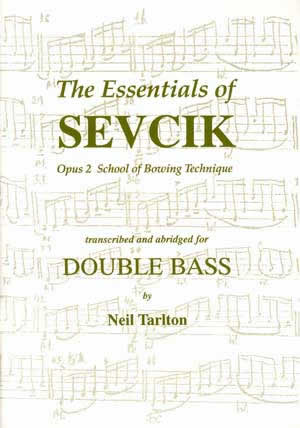The
Essentials of Sevcík |
Opus
2 School of Bowing Technique |
transcribed
and abridged for double bass by Neil Tarlton |
"This
is a 'must buy' for any serious bassist" International Society of Bassists |

For nearly a century the exercises by Sevcík have been studied by violinists, violists, and Cellists. So it is a pleasure to have the bowing studies Opus 2 adapted for the double bass by Neil Tarlton. These excercises are of great importance to all string players desirous of improving bow control, which is, without doubt, the key to easy and confident technique.The student who practises these studies with intelligence and application will find their general control, and most importantly, tone production, improving audibly in a remarkably short time.
Emanuel
Hurwitz

"Sevcik's
Opus 2 School of Bowing Technique has been transcribed and published for
the bass in at least three different editions from various sources. The
author has done an exemplary job of faithfully transcribing these exercises,
and has created a beautiful edition in the process. An abridged version
from the violin original, it is nonetheless quite exhaustive in scope
and meticulously edited. The print and reproduction quality of this edition
are of the highest caliber. Sevcik's bowing studies have been used for
nearly a century by violinists throughout the world. Anyone seriously
studying the bass should strongly consider owning a copy. This is the
nicest edition of these studies that I've seen to date. Incorporating
this body of work into one's daily practice can greatly contribute to
a beautiful quality in tone production, as well as an intimate knowledge
and control of all bow strokes. This is a "must buy" for any
serious bassist."
International
Society of Bassists
"No serious double bassist should be without this book which is exquisitely produced and beautifully reflects Neil Tarlton's obvious respect for one of the most important bowing documents ever written." Gary Karr
"Sevcik Opus 2 has always been a pedagogic staple in the violinists' repertory, and is widely regarded as the leading text in the development of bow arm mastery. In my opinion, there is no more a comprehensive version than Neil Tariton's double bass transcription. I continue to use the book on a daily basis in my own practice, and introduce it to all my students at a very early stage in their development. I believe it should be on every players' music stand." Alex Henery, solo bass Sydney Symphony
"Neil Tarlton's adaptation af Sevcik's School of Bowing Technique is an invaluable book that should be of enormous benefit to any bassist interested in improving their sound and bow control. An essential part of any bassist's library ..." Duncan McTier
Double bass Soloist, Chamber & Orchestral Principal
"The Essentials of Sevcik" is the first truly successful adaption of these violin studies for double bass. Violinists have enjoyed the benefits of these studies for generations. Bassists, at last, will have the same opportunity to hone their bow technique. It really does work." Michael Morgan, Queensland Conservatorium; Professor of Double Bass, Head of Orchestral Studies, Head of Ensemble Studies.
" I have reviewed [Neil Tarlton's] transcription for Double Bass of the School of Bowing Technique Opus 2 of Sevcik' and find it admirable in every way. I think it will be an important contribution to the double bass, pedagogy, and I believe that its inclusion in any conservatory course would be very, beneficial as well as its being made availabile, to professionals desiring, to improve their technique." Lorin Maazel (Conductor)